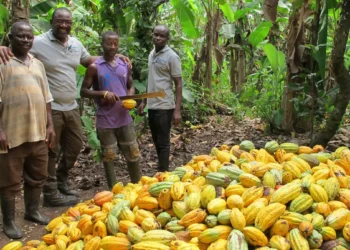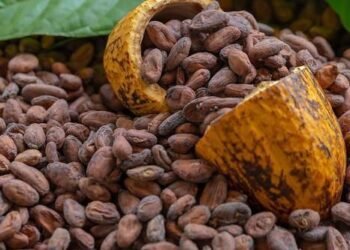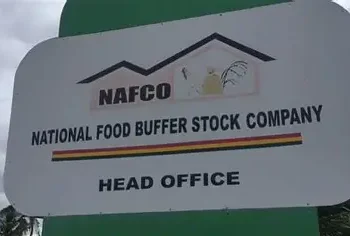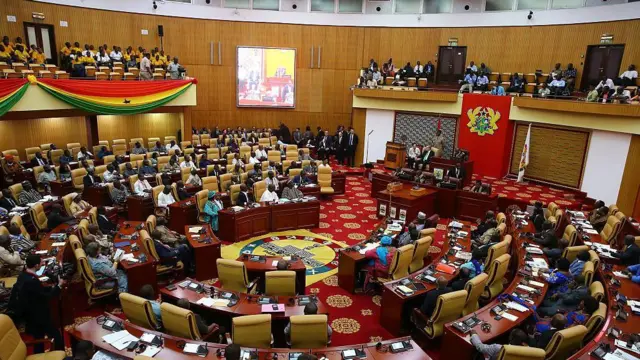Co-convener of the Ghana Civil-Society Cocoa Platform (GCCP), Obed Owusu Addai, has called on COCOBOD and relevant stakeholders to reconsider the legislative framework that governs cocoa production in the country.
According to him, some of the regulations does not favor the survival and profitability of farmers in the country. He revealed that COCOBOD can do more to help farmers under the current circumstance.
Mr Owusu-Addai noted that the existing COCOBOD law which guides cocoa production and sales was passed in 1981 and amended somewhere in 1991. He explained that the law makes certain provisions that overly gives too much power to COCOBOD when it comes to processing of the cocoa.
“For example, if you are a cocoa farmer in Ghana and you produce your own cocoa beans, you cannot put value on your beans. This is some of the laws that are hindering the ability of the downstream processing of beans. We think there should be a lot that COCOBOD should be doing and it should start from re-orienting and retooling the legislative framework governing cocoa production in Ghana.”
Obed Owusu Addai
Furthermore, Mr Owusu-Addai indicated that the regulation required needs to be urgently attended to and discussed by COCOBOD and stakeholders. He noted that there is also the need to be a lot more upstream processing of cocoa beans.
“Ghana doesn’t process beans, only a few chocolate companies are operating in Ghana and most of the things they produce go to the export market.”
Obed Owusu Addai
Legislations hampering cocoa production
Elaborating on the legislations and policies hampering cocoa growth in the country, Mr Owusu-Addai stated that one of the major issue has to do with cocoa pricing. He highlighted that when it comes to how much of the money from the sale of cocoa beans goes to the farmer, it is woeful.
“Currently, per the PPRC regulation, the cocoa farmer is to get not less than 70% of the FOB price…”
Obed Owusu Addai
Commenting on the Africa cocoa exchange which is a platform expected to help producers of cocoa in Africa exercise some control in pricing of cocoa, Mr Owusu-Addai stated that it is long overdue.
He noted that Ghana, Cote D’Ivoire and other African countries, produce cocoa but don’t trade in the commodity because there’s no market in Africa for trading cocoa. With this, he explained that it’s either on the London Stock Exchange of the New York Stock Exchange which trades in it.
Nonetheless, he stated that if the platform is implemented very well, then Ghana, Cote D’Ivoire and other African countries will have control over how they trade in their cocoa beans.
“I think that has been one of the fundamental problems or challenges within our trading of cocoa… Beyond setting up the Africa cocoa exchange, we also need to look at the production. How do we manage our production? Should we continue to overproduce and flood the market with cocoa beans which will put down the price? Or do we look at how we manage between Ghana and Cote D’Ivoire and see the over 3 million metric tonnes every year?”
Obed Owusu Addai
Additionally, the co-covener of GCCP underscored that the problems within the cocoa sector isn’t merely about the trading aspect but that of the supply side as well. He stated that when it comes to Ghana and Cote D’Ivoire, both countries are overproducing.
Commenting on the industry’s performance over the years, Mr Owusu-Addai stated that Ghana has been doing “pretty okay”, although for some time, “productivity” has dwindled. He explained that a couple of years ago Ghana hit one million metric tonnes, but for the past few years it has been producing just around 800,000 metric tonnes of cocoa.
“This year, we spoke with the COCOBOD and we don’t seem to be on track to getting the quantities we are looking for. There are several factors in accounting for our inability to producing the quantities that we want.”
Obed Owusu Addai
READ ALSO: I Am Equipped To Win The Elusive Third Consecutive Victory In 2024- Kwabena Agyepong





















